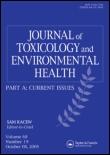
JOURNAL OF TOXICOLOGY AND ENVIRONMENTAL HEALTH-PART A-CURRENT ISSUES
Scope & Guideline
Pioneering Insights into Human Health and Environmental Agents
Introduction
Aims and Scopes
- Toxicological Assessments:
Research focusing on the toxicity of chemical substances, including pharmaceuticals, pesticides, heavy metals, and environmental pollutants, using in vitro and in vivo models. - Environmental Impacts on Health:
Studies exploring how environmental factors, such as air pollution, water contaminants, and occupational exposures, affect human health and ecological systems. - Phytotoxicity and Ecotoxicology:
Investigations into the effects of plant extracts and environmental chemicals on plant and animal life, including bioaccumulation and ecosystem health. - Mechanistic Studies:
Research that delves into the cellular and molecular mechanisms of toxicity, including oxidative stress, DNA damage, and metabolic pathways. - Risk Assessment and Regulatory Science:
Studies aimed at evaluating the risks associated with exposure to toxic substances and developing frameworks for regulatory decision-making. - Innovative Methodologies:
The journal encourages the development and application of novel methodologies, such as metabolomics, nanotoxicology, and computational models, in toxicological research.
Trending and Emerging
- Nanotoxicology:
There is a growing interest in studying the toxic effects of nanomaterials, including their interaction with biological systems and potential health risks. - Phytochemical Research:
Research into the cytotoxic and therapeutic properties of plant extracts is increasingly prominent, highlighting the potential of natural compounds in combating toxicity. - Microplastics and Environmental Health:
Studies focusing on the toxicity of microplastics and their impact on aquatic and terrestrial ecosystems are gaining traction, indicating a rising concern over plastic pollution. - Cumulative Exposure Studies:
An emphasis on understanding the health impacts of cumulative exposures to multiple environmental toxins is emerging, moving beyond single-agent assessments. - Molecular Mechanisms of Toxicity:
There is an increasing focus on elucidating the molecular and cellular mechanisms underlying toxicological effects, paving the way for targeted therapeutic strategies. - Epidemiological Studies on Environmental Pollutants:
Research linking environmental pollutants to health outcomes in human populations is trending, underscoring the importance of real-world implications of toxic exposures.
Declining or Waning
- Traditional Chemical Toxicology:
There is a noticeable decline in research focused solely on traditional chemical toxicology without the integration of novel methodologies or interdisciplinary approaches. - Single Agent Studies:
Research examining the toxicity of single agents is becoming less frequent, with a shift towards studying combined exposures and their cumulative effects. - In Vivo Animal Models:
The reliance on in vivo animal models is decreasing as there is a growing interest in alternative methodologies, such as in vitro assays and computational predictive models. - General Environmental Monitoring:
Broad studies on environmental monitoring without specific toxicological focus are less common, as the journal emphasizes more detailed mechanistic insights and health outcomes. - Conventional Risk Assessment Models:
The declining use of traditional risk assessment frameworks suggests a shift towards more contemporary, integrated approaches that consider multiple exposure pathways and cumulative risks.
Similar Journals
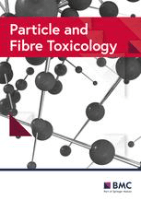
Particle and Fibre Toxicology
Leading the charge in toxicological research.Particle and Fibre Toxicology is a leading open-access journal dedicated to advancing the field of toxicology, specifically focusing on the health impacts of particulate matter and fibers. Published by BMC since 2004, this journal operates from its offices in the United Kingdom and has gained significant recognition in the scientific community, achieving an impressive impact factor that highlights its relevance and influence. As indicated by its Q1 ranking in various categories including Health, Toxicology and Mutagenesis and Medicine (miscellaneous), it occupies a prestigious position in the academic landscape, appealing to researchers, professionals, and students alike. With a Scopus ranking of #4 in Toxicology and #7 in Environmental Science, the journal ensures high visibility and accessibility, providing a platform for the dissemination of key research findings and innovative methodologies in the interdisciplinary domains of toxicology. Through its commitment to open access, Particle and Fibre Toxicology fosters knowledge-sharing and collaboration, facilitating significant advancements in our understanding of the toxicological effects of environmental agents.

JOURNAL OF APPLIED TOXICOLOGY
Pioneering Research for Public Health and SafetyJOURNAL OF APPLIED TOXICOLOGY, published by Wiley, stands as a leading platform in the field of toxicology, focusing on the rigorous examination of chemical substances and their effects on biological systems. With an impressive Impact Factor, it ranks in the top quartile (Q2) for toxicology journals, reflecting its esteemed position within the scientific community. The journal, identifiable by its ISSN 0260-437X and E-ISSN 1099-1263, has been an invaluable resource since its inception in 1981, and it continues to serve as a conduit for innovative research and practical applications through 2024. Positioned at the forefront of the field, it garners recognition in the Scopus Rankings, where it ranks #31 out of 133 journals in the toxicology category, placing it in the 77th percentile—a testament to its contribution to the advancement of pharmacology and toxicological sciences. While not an open-access journal, it remains accessible to a wide audience of researchers, professionals, and students eager to explore cutting-edge findings in applied toxicology, making it a pivotal resource for enhancing knowledge and fostering collaboration in the field.
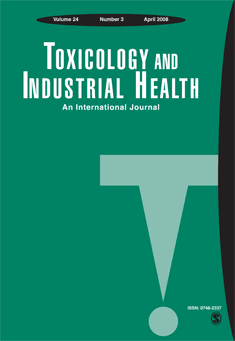
TOXICOLOGY AND INDUSTRIAL HEALTH
Exploring the complexities of toxicology for public health advancement.TOXICOLOGY AND INDUSTRIAL HEALTH, published by SAGE PUBLICATIONS INC, is a premier journal in the field of toxicology, public health, and environmental health, with a significant history dating back to 1985. With its ISSN 0748-2337 and E-ISSN 1477-0393, the journal provides a platform for disseminating groundbreaking research and comprehensive reviews that address the complexities of toxic substances in industrial and occupational settings. Despite its Q3 ranking among peers in health, toxicology, and public health, this journal is becoming increasingly influential, reflected in its growing citation metrics. Researchers and professionals benefit from its commitment to fostering knowledge in both theoretical and practical contexts, making it an essential resource for those dedicated to advancing understanding in this vital field. The journal's main objectives include promoting research addressing the implications of toxicology on health and safety standards across industries, ensuring accessibility to current studies for a global audience. Overall, TOXICOLOGY AND INDUSTRIAL HEALTH plays a critical role in bridging the gap between research and real-world applications, proving invaluable to students, professionals, and researchers alike in their pursuit of enhancing public health and environmental safety.
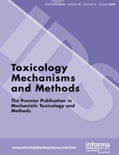
TOXICOLOGY MECHANISMS AND METHODS
Leading the charge in toxicology advancements globally.TOXICOLOGY MECHANISMS AND METHODS is a distinguished peer-reviewed journal dedicated to the advancement of toxicological research, published by Taylor & Francis Ltd. With its ISSN 1537-6516 and E-ISSN 1537-6524, this esteemed journal features critical studies and innovative methodologies in the field of toxicology, aligning with its mission to enhance understanding of biological mechanisms and risk assessment. The journal holds a commendable Q2 ranking in both the Health, Toxicology and Mutagenesis, and Toxicology categories, as well as strong positions in Scopus rankings, reflecting its influence with a 71st percentile rank in Toxicology and a 69th percentile rank in Environmental Health. Researchers, professionals, and students in the toxicology domain will find this journal to be an invaluable resource, offering open access options that foster widespread dissemination of its findings. Since its inception, encompassing converged years from 1991 to 1995 and from 2002 to 2024, the journal remains at the forefront of critical discourse and innovative research methods, making it a vital platform for advancing toxicological science globally.

Environnement Risques & Sante
Bridging the Gap Between Ecology and Human Well-beingEnvironnement Risques & Sante is a prominent journal focused on the intersection of environmental issues, public health, and safety, offering a platform for scholarly discourse on the critical challenges posed by environmental risks to human health. Published by JOHN LIBBEY EUROTEXT LTD, this journal aims to disseminate impactful research that enhances our understanding of toxicology, mutagenesis, and their implications for public health policy and practices. Though it ceased coverage in Scopus in 2021, its historical contributions remain relevant, addressing urgent topics in environmental science and occupational health. Researchers and professionals engaged in these fields will find valuable insights and findings that inform practice and promote sustainable solutions. For interested readers, further exploration of the journal can provide essential knowledge in coping with contemporary environmental health challenges.
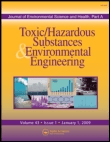
JOURNAL OF ENVIRONMENTAL SCIENCE AND HEALTH PART A-TOXIC/HAZARDOUS SUBSTANCES & ENVIRONMENTAL ENGINEERING
Pioneering research for a safer, healthier environment.JOURNAL OF ENVIRONMENTAL SCIENCE AND HEALTH PART A-TOXIC/HAZARDOUS SUBSTANCES & ENVIRONMENTAL ENGINEERING, published by TAYLOR & FRANCIS INC, stands at the forefront of research in the dynamic fields of environmental science and public health. With an ISSN of 1093-4529 and an E-ISSN of 1532-4117, this journal serves as a pivotal platform for disseminating significant findings regarding toxic substances and their impact on the environment and human health. It is categorized in the Q3 quartile for both Environmental Engineering and Medicine in 2023, showcasing its relevance within these disciplines. Researchers will find valuable insights in the 90th rank among 197 in the Environmental Science and Engineering category, placing it in the 54th percentile among its peers. While access options remain traditional rather than open-access, the journal is dedicated to serving as an essential resource for professionals and academics engaged in understanding the intricate connections between hazardous materials and environmental safety. The journal has consistently published critical research since its inception in 1978 and is committed to advancing knowledge up to 2024, making it a crucial venue for ongoing discussions and developments in environmental health.

Toxicological Research
Pioneering insights into the impact of toxins on our world.Toxicological Research is a prominent academic journal dedicated to advancing the field of toxicology through rigorous exploration and innovative research. Published by the Korean Society of Toxicology, this journal serves as a vital resource for researchers, professionals, and students engaged in environmental science, pharmacology, and toxicology. With an ISSN of 1976-8257 and an E-ISSN of 2234-2753, Toxicological Research highlights significant findings and discussions in the realm of health, toxicology, and mutagenesis. Although not an open-access journal, it maintains a solid reputation as evidenced by its Q3 ranking in both health-related toxicology and general toxicology categories for 2023. The journal covers a broad spectrum of topics from fundamental research to applied toxicology and provides a unique platform for the dissemination of knowledge in a field that is increasingly relevant in today’s society. With an anticipated convergence period from 2008 to 2024, Toxicological Research continues to contribute vital insights to understanding the implications of toxic substances on health and the environment.

Journal of Environmental Science and Health Part C-Toxicology and Carcinogenesis
Pioneering Research for a Healthier TomorrowThe Journal of Environmental Science and Health Part C-Toxicology and Carcinogenesis is a vital publication in the fields of environmental science, toxicology, and cancer research, published by Taylor & Francis Inc. With an ISSN of 2689-6583 and E-ISSN 2689-6591, this journal provides a platform for peer-reviewed research that explores the intersection of environmental factors and health outcomes, particularly focusing on toxicological and carcinogenic impacts. Though it does not currently offer Open Access, it remains a significant contributor to academia with its current ranking in the Q4 category for Cancer Research and Q3 in Health, Toxicology and Mutagenesis. The journal has converged from 2020 to 2024 and aims to disseminate pioneering studies that inform public health policies and foster a deeper understanding of environmental toxins. Aspiring researchers, professionals, and students will find this journal to be an essential resource for the latest findings and discussions within these critical fields.

Reviews of Environmental Contamination and Toxicology
Pioneering insights into environmental challenges and solutions.Reviews of Environmental Contamination and Toxicology is a leading journal published by SPRINGER, dedicated to advancing the understanding of environmental science, toxicology, and public health. Since its inception in 1987, this esteemed journal has established itself as an invaluable resource for researchers and practitioners alike, showcasing a wealth of peer-reviewed articles that delve into the complexities of environmental contaminants and their effects on human health and ecosystems. With an impressive impact factor and consistently ranking in the Q1 category across multiple fields including Health, Toxicology and Mutagenesis, as well as Public Health, this journal commands attention, boasting Scopus rankings that place it among the top-tier publications globally. Researchers will find that the journal provides not only in-depth reviews but also practical implications for policy and practice regarding environmental issues. Located in the heart of New York, Reviews of Environmental Contamination and Toxicology is poised to remain at the forefront of this critical field through 2024 and beyond, making it an essential addition to the library of any environmental health scholar or practitioner.

ARCHIVES OF TOXICOLOGY
Transforming Knowledge into Public Health SolutionsARCHIVES OF TOXICOLOGY is a prestigious journal published by Springer Heidelberg, dedicated to advancing research in the field of toxicology and related disciplines. With a distinguished history dating back to 1930, this journal has continuously provided vital insights and groundbreaking studies, making it a cornerstone in the areas of health, toxicology, and medicine. Recognized for its high impact, it occupies a top-ranking position in Scopus, with remarkable quartile placements in 2023, categorizing it as Q1 in Health, Toxicology and Mutagenesis, and Q1 in Medicine (Miscellaneous). The journal highlights critical research and innovative methodologies, appealing to a diverse audience of researchers, professionals, and students committed to understanding the complexities of toxic substances and their implications for public health and environmental safety. The journal does not currently offer open access, allowing for a more traditional but rigorous peer-review process that ensures the quality and integrity of every published article. Join the global discourse in toxicological science with ARCHIVES OF TOXICOLOGY, where every contribution furthers the understanding of safety and toxicity in our world.